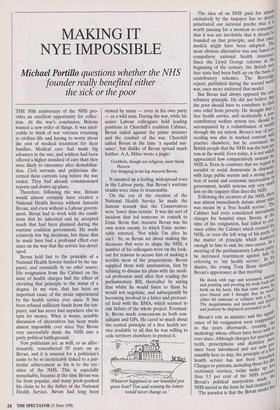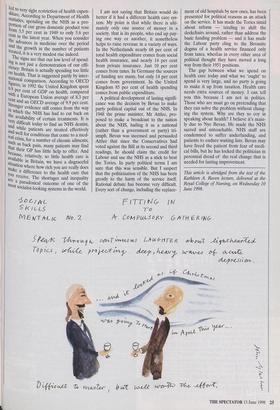MAKING IT NYE IMPOSSIBLE
Michael Portillo questions whether the NHS
founder really benefited either the sick or the poor
THE 50th anniversary of the NHS pro- vides an excellent opportunity for reflec- tion. At the war's conclusion, Britons wanted a new order of things. It was intol- erable to think of war veterans returning to civilian life and having to worry about the cost of medical treatment for their families. Medical care had made big advances in the war, and soldiers had been offered a higher standard of care than they were likely to encounter after demobilisa- tion. Civil servants and politicians dis- cerned these currents long before the war ended. They had already commissioned reports and drawn up plans.
Therefore, following the war, Britain would almost certainly have created a National Health Service without Aneurin Bevan, and even without a Labour govern- ment. Bevan had to work with the condi- tions that he inherited and he accepted much that had been planned during the wartime coalition government. He made relatively few big decisions, but those that he made have had a profound effect ever since on the way that the service has devel- oped.
Bevan held fast to the principle of a National Health Service funded by the tax- payer, and essentially by no other source. His resignation from the Cabinet on the issue of health charges had the effect of elevating that principle to the status of a dogma. In my view, that has been an important cause of the strain experienced by the health service ever since. It has been refused sufficient funds from the tax- payer, and has never had anywhere else to turn for money. What is worse, sensible discussion of alternatives has been made almost impossible ever since Nye Bevan very successfully made the NHS into a party political battleground.
Few politicians are as well, or as affec- tionately, remembered 50 years on as Bevan, and it is unusual for a politician's name to be so inextricably linked to a par- ticular achievement as his is to the cre- ation of the NHS. This is especially remarkable, because at the time Bevan was far from popular, and many pooh-poohed his claim to be the father of the National Health Service. Bevan had long been viewed by many — even in his own party — as a wild man. During the war, while his senior Labour colleagues held leading positions in Churchill's coalition Cabinet, Bevan railed against the prime minister and the conduct of the war. Churchill called Bevan at the time 'a squalid nui- sance', but dislike of Bevan spread much further. A.A. Milne wrote a jingle: Goebbels, though not religious, must thank Heaven
For dropping in his lap Aneurin Bevan.
It summed up a feeling, widespread even in the Labour party, that Bevan's wartime tirades were close to treasonable.
On the eve of the creation of the National Health Service he made the famous remark that the Conservatives were 'lower than vermin'. It was the sort of incident that led someone to remark to Ernie Bevin that Aneurin Bevan was his own worst enemy, to which Ernie memo- rably retorted, 'Not while I'm alive he ain't.' So, as Bevan set about making the decisions that were to shape the NHS, a number of his colleagues were on the look- out for reasons to accuse him of making a terrible mess of the preparations. Bevan supplied them with ammunition, first by refusing to discuss his plans with the medi- cal profession until after first reading the parliamentary Bill, thereafter by saying that whilst he would listen to them he would not negotiate, and subsequently by becoming involved in a bitter and protract- ed feud with the BMA, which seemed to risk failure of the whole project. Eventual- ly, Bevan made concessions to both con- sultants and GPs. He cared so much about the central principle of a free health ser- vice available to all that he was willing to cede territory elsewhere to protect it.
`Whatever happened to our beautiful pea green boat? You said winning the lottery would never change us.' The idea of an NHS paid for almost exclusively by the taxpayer has so deePlY penetrated our national psyche that it is worth pausing for a moment to remember that it was not inevitable that it should he founded on that principle, and that other models might have been adopted. The most obvious alternative was one based on compulsory national health insurance Since the Lloyd George reforms at the beginning of the century, the British Wel" fare state had been built up on the basis of contributory schemes. The Beveridge report, published during the second world war, once more endorsed that model. But Bevan had always opposed the colt" tributary principle. He did not believe th,,al the poor should have to contribute to the' own relief from poverty. He thought that free health service, and incidentally a 11°°- contributory welfare system too, should be accompanied by a redistribution of wealth through the tax system. Bevan's way of poi", ceeding was also in marked contrast Wit' practice elsewhere, but he convinced the British people that the NHS was the best St tern in the world. Even today, it is not vIttl,v appreciated how comparatively unusual We NHS is. Even in countries that we regard as socialist or social democratic in character' with large public sectors and a strong tradi' tion of social and economic intervention government, health systems rely very Mul''P less on the taxpayer than does the NHS- Following the creation of the NHS, thcret was almost immediately debate about wIl!e was meant by a 'free health service'. The Cabinet had even considered introducnigan charges for hospital stays. Bev, at time of his resignation, had failed to e°e ,_ti: vince either the Cabinet which created to' of NHS, or even the left wing of his partY'red the matter of principle which matte enough to him to sink his own career. Ata meeting of the parliamentary Labour pa A political development of lasting signifi- cance was the decision by Bevan to make party political capital out of the NHS. In 1948 the prime minister, Mr Attlee, pro- posed to make a broadcast to the nation about the NHS, hailing it as a national (rather than a government or party) tri- umph. Bevan was incensed and persuaded Attlee that since the Conservatives had voted against the Bill at its second and third readings, he should claim the credit for Labour and use the NHS as a stick to beat the Tories. In party political terms I am sure that this was sensible. But I suspect that the politicisation of the NHS has been greatly to the harm of the service itself. Rational debate has become very difficult. Every sort of change, including the replace- merit of old hospitals by new ones, has been presented for political reasons as an attack on the service. It has made the Tories timid about reform — tending to shift the deckchairs around, rather than address the basic funding problem — and it has made the Labour party cling to the Bevanite dogma of a health service financed only from taxes, whereas in every other area of political thought they have moved a long way from their 1951 positions. The gap between what we spend on health care today and what we 'ought' to spend is very large, and no party is going to make it up from taxation. Health care needs extra sources of money. I can tell you this because I am not in politics. Those who are must go on pretending that they can solve the problem without chang- ing the system. Why are they so coy in speaking about health? I believe it's main- ly due to Nye Bevan. He made the NHS sacred and untouchable. NHS staff are condemned to suffer underfunding, and patients to endure waiting lists. Bevan may have freed the patient from fear of medi- cal bills, but he has locked the politician in perennial dread of the real change that is needed for lasting improvement. This article is abridged from the text of the Kathleen A. Raven lecture, delivered at the Royal College of Nursing, on Wednesday 10 June 1998.



































































 Previous page
Previous page